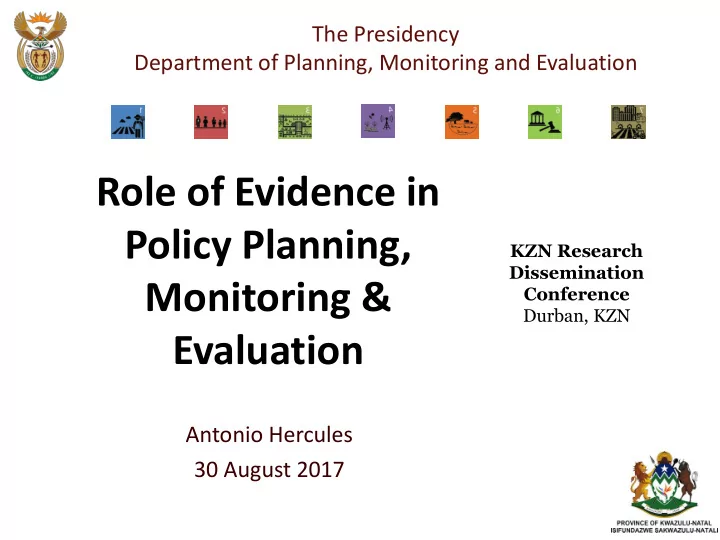

The Presidency Department of Planning, Monitoring and Evaluation Role of Evidence in Policy Planning, KZN Research Dissemination Monitoring & Conference Durban, KZN Evaluation Antonio Hercules 30 August 2017
Summary Importance of evidence Why use of evidence is critical for strategic management The Presidency: Department of Planning, Monitoring and Evaluation 3
Evidence-based policy-making The Presidency: Department of Planning, Monitoring and Evaluation 4
Evidence-based policy and practice • Helping people make better decisions and achieve better outcomes, by using the best available evidence from research and other sources • Knowing what are effective interventions (“what works?”) • In achieving which outcomes? • For which groups of people? • Under what conditions? • Over what time span? • At what costs?, plus • Integrating research with decision makers’ knowledge, skills, experience, expertise and judgement Source: Phil Davies, course in Evidence-Based Policy Making and Implementation
Some problems with evidence • Evidence is not the only factor • Little agreement on what counts as ‘evidence’ • Evidence is always contestable/contested • Evidence is seldom definitive, nor self-evident • Evidence is almost always probabilistic/uncertain • Not all evidence is of equal value • Not all research is of equal value/sufficient quality • Positive evidence is usually reported more than negative • We need the balance of evidence – research synthesis • Source: Phil Davies, course in Evidence-Based Policy Making and Implementation The Presidency: Department of Planning, Monitoring and Evaluation
Evidence versus Opinion Evidence : (Wide and deep) Data that meet the standards of: • internal validity (coherent – shows causality between variables) • external validity (a study that allows its findings to generalize) • reliability – consistency of data (test-retest) • adequacy of reporting – statistics adequate and data support findings Opinion • Statements and claims that do not meet the standards of evidence • Key qualities: positional, subjective, partial (selective), hard to verify
Evidence Based Policy Making and Implementation Intervention Theory Options for of addressing the change problem Understand- Design ing the root causes DIAGNOSING PLANNING Operational plan What is known Analysis of the Policy/Program and resourcing about the problem and me planning and problem options budgeting Document, Agenda evaluate, reflect & learn OUTPUT Implementing OUTCOME & What is the Implementation the plan IMPACT change – and monitoring desired and undesired? Monitoring the plan, Value for environment and money? Are planned budget outcomes Review, being refine and achieved? The Presidency: Department of Planning, Monitoring and Evaluation continue
Where in Policy Cycle do you use evidence? None / weak All Evaluate Imple & Monitor Intervent Design Analysis & ToC Agenda Setting 0 5 10 15 20 25 9
Type of evidence most often used for policy decision-making (interviews with 55 senior managers) All Research Synthesis Scientific Research Formal Research More of Substantive Current Informal Opinion None 0 5 10 15 20 25 The Presidency: Department of Planning, Monitoring and Evaluation 10
The main factors that influence policy (interviews with 55 senior managers) Evidence Pragmatics & Contingencies Experience & Expertise Future Judgement Current Resources Values Habits & Traditions Lobbyists & Pressure Groups 0 5 10 15 20 25 30 The Presidency: Department of Planning, Monitoring and Evaluation 11
Definitions C ONTINUUM OF T YPES & S OURCES OF E VIDENCE U SED None Opinion Informal Substantive Formal Scientific Review & Research Research assessment of available evidence No Of the Anecdotal, Careful Empirical, Statistical, Testing, explicit policy stories, truth appropriate compara- analysing & basis makers; or uncritical seeking, design & tive, causal synthesising for broadly use of develop- methodol- available policy accepted information mental ogy evidence. Rapid decis- public to hand, evaluation, reviews; ions opinion; partial & data systematic lobby limited analysis of enquiry; meta- groups; survey & analysis others admin data Adapted from: Hayes, W, 2002, The Policy Cycle 12
Evidence Based Policy Making and Implementation Intervention Theory Options for of addressing the change problem Understand- Design ing the root causes DIAGNOSING PLANNING Operational plan What is known Analysis of the Policy/Program and resourcing about the problem and me planning and problem options budgeting Document, Agenda evaluate, reflect & learn OUTPUT Implementing OUTCOME & What is the Implementation the plan IMPACT change – and monitoring desired and undesired? Monitoring the plan, Value for environment and money? Are planned budget outcomes Review, being refine and achieved? The Presidency: Department of Planning, Monitoring and Evaluation continue
Different types of evaluations related to questions around the outcome model Expenditure Review (NT) What are the activities, are they cost-effective? Impact evaluation Has the intervention had impact at outcome and impact level, and why Economic Evaluation What are the cost-benefits? Implementation evaluation - what is happening and why DESIGN Diagnostic Design evaluation what is the underlying situation Does the theory of and root causes of the change seem strong? problem 14 The Presidency: Department of Planning, Monitoring and Evaluation
Government Proj/Prog Monit itorin ing System Main Main results monitoring reported here data here 15
Implementation Evaluations: sense of emphasis, importance 1. Design Effectiveness (ToC, results framework ) 1. Org. Efficiency 2. Outputs Design 3. “Results” 2. Manage- (immediate ment & outcomes) Account- to date ability 3. Value-for- money? Sustainability 1. Institut- Comparison 1. Relevant 1. Current Relevance ionalization Impact & aligned? Data 4. Systems, 2. Financial Procedures 2. Appro- 2. Emerging 3. Content priate for Insights, Context and Lessons Stake- Sources of holders Sources of Evidence: Sources of prog/dept. Sources of Sources of Evidence: Policy Evidence: Policy documents, monitoring documents, Evidence: Evidence: Policy quality documents, prog/dept. records, other prog/dept. records eg prog/dept. programme/dep monitoring monitoring records, minutes, records, primary monitoring t monitoring primary records, primary records literature data evaluation data evaluation data evaluation data
Thank you Antonio Hercules Evidence and Knowledge Systems antonio@dpme.gov.za www.thepresidency-dpme.gov.za The Presidency: Department of Planning, Monitoring and Evaluation 17
Recommend
More recommend